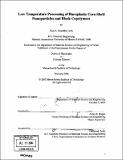| dc.contributor.advisor | Anne M. Mayes. | en_US |
| dc.contributor.author | González-León, Juan A. (Juan Antonio) | en_US |
| dc.contributor.other | Massachusetts Institute of Technology. Dept. of Materials Science and Engineering. | en_US |
| dc.date.accessioned | 2007-02-21T12:06:11Z | |
| dc.date.available | 2007-02-21T12:06:11Z | |
| dc.date.copyright | 2005 | en_US |
| dc.date.issued | 2006 | en_US |
| dc.identifier.uri | http://hdl.handle.net/1721.1/36202 | |
| dc.description | Thesis (Ph. D.)--Massachusetts Institute of Technology, Dept. of Materials Science and Engineering, February 2006. | en_US |
| dc.description | Includes bibliographical references (p. 131-144). | en_US |
| dc.description.abstract | Baroplastics are nanophase polymeric materials comprised of two components that can miscibilize under pressure thereby facilitating flow. The possibility of processing these materials at low temperatures was the main focus of this work. Block copolymer baroplastics comprised of a low Tg and a high Tg component that microphase separate, such as polystyrene-block-poly(butyl acrylate) (PS-b-PBA) and polystyrene-b-poly(2-ethyl hexylacrylate) (PS-b-PEHA), were synthesized by ATRP and processed at reduced temperatures by compression molding. The resulting processed specimens were clear and well-defined solid objects. Structural characterization studies on the processed baroplastics showed that the mixing between components during processing is incomplete and distinct hard and soft domains are present even after multiple processing cycles. This suggests that the processing is of a semi-solid nature, where the rigid PS domains are mobilized by the low Tg component. Processing of a control sample exhibiting pressure-induced demixing, polystyrene-block-poly(lauryl methacrylate) (PS-b-PLMA), yielded incompletely processed objects under the same processing conditions and inferior mechanical properties to its acrylate counterparts. | en_US |
| dc.description.abstract | (cont.) Low temperature processing of baroplastics and the proposed semi-solid processing mechanism were further demonstrated with the study of core-shell nanoparticles, where the soft homopolymer (PBA or PEHA) formed the core surrounded by a rigid PS shell. These materials could also be processed at reduced temperatures, displaying a wide range of mechanical properties as a function of their composition, going from tough and rigid materials to soft and rubbery ones comparable to commercial thermoplastic elastomers. Low temperature processing of baroplastics opens a new route to polymer processing, where energy for heating and cooling could be saved, processing times could be reduced and materials with high sensitivity to temperature could be processed. | en_US |
| dc.description.statementofresponsibility | by Juan A González-León. | en_US |
| dc.format.extent | 144 p. | en_US |
| dc.language.iso | eng | en_US |
| dc.publisher | Massachusetts Institute of Technology | en_US |
| dc.rights | M.I.T. theses are protected by copyright. They may be viewed from this source for any purpose, but reproduction or distribution in any format is prohibited without written permission. See provided URL for inquiries about permission. | en_US |
| dc.rights.uri | http://dspace.mit.edu/handle/1721.1/7582 | |
| dc.subject | Materials Science and Engineering. | en_US |
| dc.title | Low temperature processing of baroplastic core-shell nanoparticles and block copolymers | en_US |
| dc.type | Thesis | en_US |
| dc.description.degree | Ph.D. | en_US |
| dc.contributor.department | Massachusetts Institute of Technology. Department of Materials Science and Engineering | |
| dc.identifier.oclc | 76893938 | en_US |

